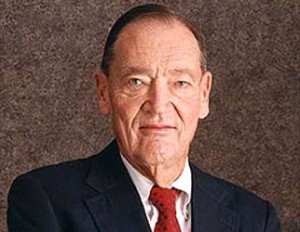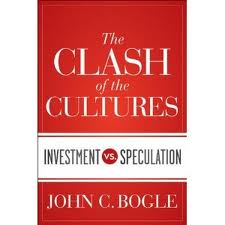Stocks should return 7.5% annually over next decade, Bogle’s new book says
Investment returns vs speculative capital gains is a big theme in The Clash of the Cultures.
Advertisement
Investment returns vs speculative capital gains is a big theme in The Clash of the Cultures.
 A reasonable expectation for annual stock returns over the next decade is 7.5%, versus 3.5% for bonds, says John Bogle in his just-published book, The Clash of the Cultures.
A reasonable expectation for annual stock returns over the next decade is 7.5%, versus 3.5% for bonds, says John Bogle in his just-published book, The Clash of the Cultures.
 Historically, most of the returns from the stock market have arisen because of investment returns (primarily earnings growth and dividends), not speculative capital gains, Bogle says. This is a major theme of the book, which is subtitled Investment vs Speculation. Thus, in the past 40 years, the annual investment return was 9%, “almost precisely equal to the stock market’s total return of 9.3%,” Bogle says in Chapter 9, “The speculative return on stocks was just 0.3%.”
But speculation accounts for a huge percentage—99.2%—of the activities of the equity market system, compared to a tiny 0.8% for capital formation. Bogle estimates that annual trading in stocks averaged $33 trillion while capital formation—which he defines as directing fresh investment capital to its highest and best uses—averaged just $250 billion.
Historically, most of the returns from the stock market have arisen because of investment returns (primarily earnings growth and dividends), not speculative capital gains, Bogle says. This is a major theme of the book, which is subtitled Investment vs Speculation. Thus, in the past 40 years, the annual investment return was 9%, “almost precisely equal to the stock market’s total return of 9.3%,” Bogle says in Chapter 9, “The speculative return on stocks was just 0.3%.”
But speculation accounts for a huge percentage—99.2%—of the activities of the equity market system, compared to a tiny 0.8% for capital formation. Bogle estimates that annual trading in stocks averaged $33 trillion while capital formation—which he defines as directing fresh investment capital to its highest and best uses—averaged just $250 billion.
“I don’t expect that P/E to be a lot different when 2022 begins. Result: a speculative return of zero, more or less. Combining the two sources, reasonable expectations suggest an annual total stock market return of 6 to 9 per cent during the coming decade.”Addressing bond returns, assuming a mix of one-third Treasuries and two-thirds corporate bonds, Bogle says investors could expect a fundamental return “near today’s yield of around 3 per cent.” Over 10 years, there should be no significant speculative return, so he pegs the annual total return on bonds at between 2 and 4%. However, he cautions these numbers reflect nominal returns so if inflation averages 2.5% a year, the return on a balanced 60/40 portfolio would fall from 5.4% to 3% before investment expenses. If those all-in costs come in at the 2% typical for mutual funds, then “only 1% would remain for the investor. That’s largely why index funds (0.1% cost) are such a reasonable option.”
Share this article Share on Facebook Share on Twitter Share on Linkedin Share on Reddit Share on Email